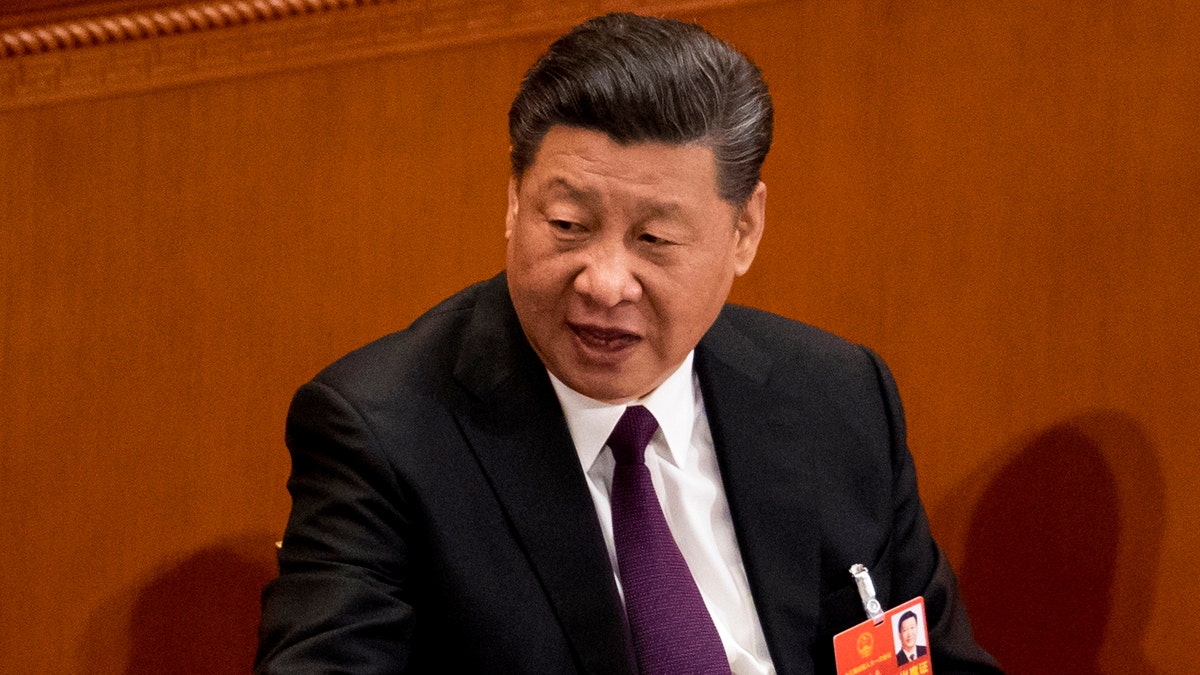Fox News Flash top headlines for May 19
Fox News Flash top headlines are here. Check out what's clicking on Foxnews.com.
The Endless Frontier Act is being welcomed by many in both parties in Congress as a long overdue effort to combat China in technology, manufacturing and on other fronts. But a pair of concerns are forcing some Republicans to make a tough choice on whether to support the bill, the current version of which costs about $130 billion but will soon be subject to a litany of potential amendments on the Senate floor.
On one hand, some Republicans fear that the bill doesn't do enough to combat one of the United States' top two geopolitical rivals. And they want to go as big as they can right now because this could be Congress' only chance outside of a National Defense Authorization Act (NDAA) to pass bipartisan China legislation for the foreseeable future. Lawmakers will soon be bogged down in President Biden's massive and controversial domestic agenda.
On the other hand, some Republicans see the topline price tag of the bill not exactly as a deal breaker but as an indication that there could be some waste inside the legislation, which was termed by the House-based Republican Study Committee as the "endless pork act."
"As it stands, much of the Endless Frontier Act will not effectively counter Communist China’s aggression. A slush fund to universities with little security and oversight isn’t the answer," Sen. Rick Scott, R-Fla., said on Tuesday. "That’s why I’m filing these critical amendments to secure American innovation, protect our national security, hold Communist China accountable and put American interests first."

Chinese President Xi Jinping talks to leaders after being formally re-elected to a second term. The Senate is working on a bill called the Endless Frontier Act, which is aimed at helping the U.S. battle China in technology, manufacturing and other economic fronts. (AP)
MISSOURI AG SERVES CHINESE COMMUNIST PARTY IN LAWSUIT OVER ‘UNLEASHING’ COVID-19
Scott spokesperson Sarah Schwirian also told Fox News that Scott "is very focused on the fact that our nation is nearing $30 trillion in debt. Every dollar spent needs to be in the best interest of American taxpayers, which is why he is working to amend the Endless Frontier Act to make sure it better serves Americans, protects our national security, and is fair to every state."
"There are some really great things in the Endless Frontier Act, and the overall effort to compete with China is absolutely essential," one Senate Republican aide told Fox News, "but this bill contains items unrelated to that effort, and all together they’ve run up a pretty exorbitant price tag when we’re staring down a $28 trillion national debt. That’s giving some conservatives pause, even if they support the underlying premise of the bill."
"As the former U.S. Ambassador to Japan, I understand more than most that the power competition with China will define the United States’ future, perhaps more than any other issue," Sen. Bill Hagerty, R-Tenn., told Fox News. "While I am still reviewing the hundreds of pages that comprise this legislation, it is my belief that this bill will need to be seriously improved through the amendment process to attract broad support. Enhancing U.S. research and development is an important part of countering Communist China, but that alone is not enough for the Senate to say it has checked the box and held the regime accountable."
The Endless Frontier Act is very likely to get the 60 votes it needs to pass the Senate and stands a strong chance in the House. Majority Leader Chuck Schumer, D-N.Y., called it "desperately needed." Minority Leader Mitch McConnell, R-Ky., meanwhile, had positive comments of his own.
"A secure, productive, and innovative America that can out-compete China is something that all 100 Senators want," McConnell said, while conceding that "in a place like the Senate, you’re guaranteed to find a wide variety of different ideas about the best ways to encourage that."
Several Republican Senate offices are touting the amendments they managed to get into the bill during the Commerce Committee process, which they say improved the legislation and made it tougher on China.
Sen. Ted Cruz, R-Texas, backed amendments banning China from controlling American radio stations, money for the extraction of rare earth minerals, blocking the sharing of nuclear technology with China and addressing Chinese spies at American universities, including Confucius Institutes.

In this Jan. 19, 2021 file photo, Sen. Ben Sasse, R-Neb., speaks on Capitol Hill, in Washington. Sasse is advocating for more money for the Defense Advanced Research Projects Agency in the Endless Frontier Act, a bipartisan bill aimed at helping the U.S. compete with China. (Anna Moneymaker/The New York Times via AP, Pool File)
Sen. Cynthia Lummis, R-Wyo., backed an amendment on rare earth minerals. She also backed another amendment to prioritize U.S. citizens and permanent residents for National Science Foundation scholarships and grants, and a separate amendment on ensure blockchain technology is a focus of a new directorate for technology created by the bill.
BEN SASSE PRESSES ODNI NOMINEE OVER HIS WORK FOR HUAWEI
Scott and other senators outside of the Commerce Committee are also readying amendments for potential floor votes. Among the amendments Scott is supporting is one to create a federal body to research the origins of the coronavirus, which many believe could have leaked from the Wuhan Institute of Virology. He also introduced an amendment that would divert unspent money from the "wasteful" coronavirus relief bill passed earlier this year to pay for the Endless Frontier Act.
Sen. Ben Sasse, R-Neb., is introducing an amendment to increase funding for the Defense Advanced Research Projects Agency.
"I’m always going to push for a tougher response to Chairman Xi – that’s why I want to double DARPA’s funding," Sasse told Fox News. "As a China Hawk, I’d like to see us target our spending on combating the threat from the CCP; as a fiscal hawk, I’d like a lower topline number for certain other non-CCP items. I’m going to keep working on countering Beijing’s aggression in the NDAA and the Intelligence Authorization Act. This is a critical fight and a worthy investment."
Sen. Steve Daines, R-Mont., who voiced his support for the Endless Frontier Act Monday, said that he planned to introduce amendments banning the president from waiving intellectual property rights on American coronavirus vaccines and to increase cybersecurity, among others.
"This is a critical investment in American science and innovation to ensure we remain globally competitive and win the race against China," a Daines spokesperson told Fox News. "Senator Daines will work to ensure the bill remains targeted to this mission."

Members of the World Health Organization (WHO) team investigating the origins of the COVID-19 coronavirus, arrive at the Wuhan Institute of Virology in Wuhan, in China's central Hubei province on February 3, 2021. Sen. Rick Scott, R-Fla., supports an amendment to the Endless Frontier Act that would create a federal body to investigate the origins of the coronavirus. (HECTOR RETAMAL/AFP via Getty Images)
But some Republicans say that while the current state of the Endless Frontier Act has been improved by GOP amendments, it's still woefully inadequate.
"A lot of folks are in for a rude awakening" when they actually read the bill, one House GOP aide opposed to the Endless Frontier Act told Fox News. The aide said that China "is really breathing a sigh of relief" that Congress is not going farther than what the Endless Frontier Act contains at this point.
"It's just insane, the price tag of the bill," that aide said. "It's astronomically high for the bill to do nothing."
The aide said the bill should include provisions to require disclosures for think tanks that are funded by the Chinese government; sanction the Chinese United Front Work Department; and more, but that it does not.
CLICK HERE TO GET THE FOX NEWS APP
In the end, however, the Endless Frontier Act is likely to be one of the most significant pieces of bipartisan legislation passed this Congress amid a 50-50 split in the Senate, tight margins in the House and a polarized political climate — even if many are not happy with the final product.
"This bill is our chance to improve how our country innovates and develops new technologies to out-compete the Chinese Communist Party. If America is to lead the world in the 21st century, we have to go on offense by passing my Endless Frontier Act when it comes to the floor," Sen. Todd Young, R-Ind., an original co-sponsor of the bill with Schumer, said of the bill after it cleared committee.
"However, I am disappointed that an amendment was adopted to divert significant funding away from the NSF Tech Directorate in favor of a program outside of the Committee’s jurisdiction thereby diluting the effectiveness of the Directorate," he added. "I will continue working with my colleagues to ensure the final product lives up to its billing — a bold investment in research, education, technology transfer, and the core strengths of the U.S. innovation ecosystem."
Fox News' Jason Donner contributed to this report.














































